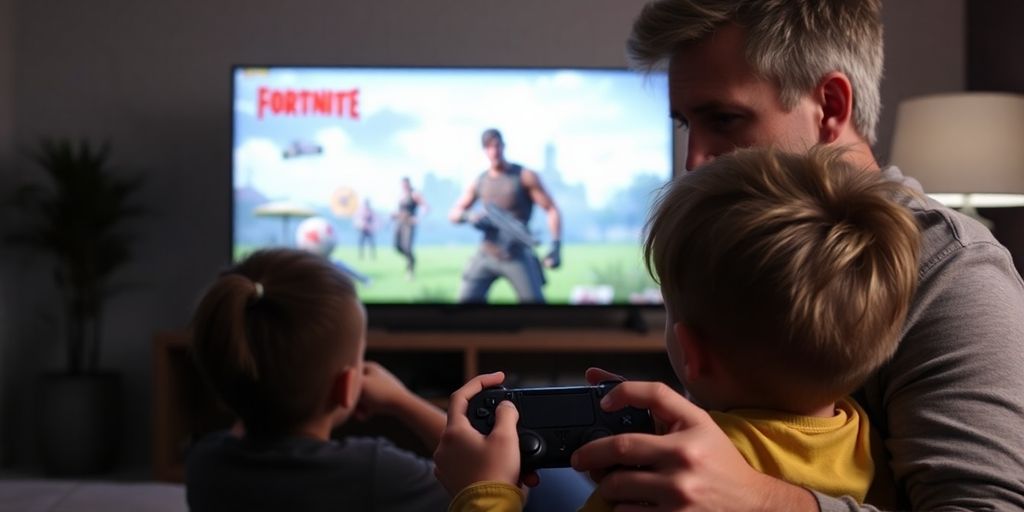
Fortnite has taken the gaming world by storm, especially among children and teens. While it can be a fun and engaging way to connect with friends, it also poses risks of addiction. Parents often find themselves grappling with how to manage their children’s gaming habits and ensure a healthy balance between play and other responsibilities. Understanding the signs of Fortnite child addiction, its causes, and ways to address it can help parents navigate this challenging landscape.
Key Takeaways
- Fortnite addiction can lead to neglecting responsibilities and interests outside of gaming.
- The game’s design, including its visuals and competitive nature, makes it particularly engaging for kids.
- Signs of addiction include ignoring chores, losing interest in other activities, and experiencing physical health issues.
- Setting clear gaming limits and encouraging other hobbies can help children find balance.
- If addiction symptoms worsen, seeking professional guidance may be necessary.
Understanding Fortnite Child Addiction
Defining Fortnite Addiction
What exactly does it mean when we say a child is addicted to Fortnite? It’s more than just enjoying the game. It’s about how the game starts to take over their life. We’re talking about a pattern of behavior where Fortnite becomes the most important thing, overshadowing school, friends, family, and even basic needs like sleep and food. Understanding this difference is the first step in addressing the problem.
The Role of Peer Pressure
Fortnite is a social game, and that’s part of its appeal. But this also means that peer pressure can play a big role in a child’s gaming habits. Kids might feel like they need to play to fit in, to keep up with their friends, or to avoid being left out.
It’s important to recognize how this pressure can contribute to excessive gaming. It’s not always just about the game itself; it’s about social acceptance. Parents can help by teaching their children about compulsive gaming and how to navigate these social dynamics.
The Impact of Social Media
Social media amplifies the Fortnite phenomenon. Kids see their favorite streamers playing, watch highlight reels, and engage in online communities centered around the game. This constant exposure can create a sense of FOMO (fear of missing out) and further fuel the desire to play. It’s a cycle: the more they see, the more they want to play, and the more they play, the more they’re exposed to.
It’s easy to dismiss this as “just a game,” but the reality is that Fortnite, like many online games, is designed to be engaging. The bright colors, the constant rewards, and the social interaction all contribute to its addictive potential. Parents need to be aware of these factors and take steps to help their children maintain a healthy balance.
Why Is Fortnite So Addictive?
Fortnite has become a global phenomenon, and it’s not by accident. The game is designed with several features that make it incredibly addictive, especially for kids and teens. Let’s explore some of the key reasons behind its captivating nature.
Incentive Systems
Fortnite uses a powerful incentive system to keep players engaged. Every match offers the potential for rewards, whether it’s winning the game, completing challenges, or unlocking new cosmetic items. This constant stream of positive reinforcement creates a sense of accomplishment and motivates players to keep playing, even after experiencing losses. It’s like a never-ending cycle of reward and anticipation. The feeling of success after a win is a big draw.
Captivating Visuals
The game’s bright colors, cartoonish graphics, and engaging animations are undeniably appealing. The visual style is designed to be attractive to a wide audience, particularly younger players. The ever-changing map and the introduction of new skins and items keep the game visually fresh and exciting. It’s a world that’s constantly evolving, which helps maintain player interest. The game’s engaging visuals are a big part of its appeal.
Interpersonal Connections
Fortnite isn’t just a game; it’s a social platform. Players can team up with friends, communicate through voice chat, and build relationships within the game. This social aspect adds another layer of engagement, as players are motivated to play not only for the game itself but also to connect with their friends. The feeling of belonging and camaraderie can be a powerful draw, especially for kids and teens who are looking for social connections.
The social element of Fortnite is a huge factor in its addictiveness. Kids want to play with their friends, and if their friends are playing Fortnite, they’re going to want to play too. It’s a way to stay connected and feel like they’re part of a group.
Recognizing Fortnite Addiction Symptoms

It’s easy to dismiss a child’s intense interest in Fortnite as just a phase, but sometimes it can be more serious. Recognizing the signs of a potential addiction is the first step in helping your child regain a healthy balance. It’s not about demonizing the game, but understanding when it’s negatively impacting their life.
Ignoring Responsibilities
One of the clearest indicators is when a child starts neglecting their responsibilities. This could manifest as skipping homework, chores, or even personal hygiene to play Fortnite. It’s more than just procrastination; it’s a consistent pattern of prioritizing the game over everything else.
This can lead to a decline in academic performance and increased conflict at home. It’s important to address this early on, before it becomes a deeply ingrained habit. Parents should restrict gaming time and help their children prioritize chores to balance gaming and life.
Loss of Interest in Other Activities
Another key symptom is a noticeable loss of interest in activities they used to enjoy. If your child used to love playing soccer, reading, or spending time with friends, but now only wants to play Fortnite, that’s a red flag. Fortnite becomes their sole source of entertainment and fulfillment, crowding out other hobbies and interests. This can lead to social isolation and a lack of diverse experiences.
Here’s a quick checklist to consider:
- Does your child rarely mention other hobbies?
- Do they decline invitations to participate in non-gaming activities?
- Have they stopped pursuing activities they previously enjoyed?
Physical Health Issues
Spending excessive amounts of time playing Fortnite can also take a toll on their physical health. This can range from minor issues like eye strain and headaches to more serious problems like sleep deprivation and carpal tunnel syndrome. Pay attention to whether your child is experiencing any of the following:
- Frequent headaches or migraines
- Dry or irritated eyes
- Poor posture or back pain
- Changes in sleep patterns (insomnia or excessive sleepiness)
It’s important to remember that these are just potential symptoms, and not every child who exhibits them is necessarily addicted to Fortnite. However, if you notice a combination of these signs, it’s worth having a conversation with your child and considering seeking professional help.
How to Help Your Kids Overcome Fortnite Addiction
It’s tough seeing your kid glued to Fortnite, but there are definitely ways to help them find a healthier balance. It’s not about banning the game completely (though that might be necessary in some cases), but more about teaching them moderation and showing them there’s a whole world of fun outside the screen.
Setting Clear Boundaries
The first step is to set some ground rules. Sit down with your child and talk about how much time they can spend playing Fortnite each day or week. Be clear about when they can play – maybe only after homework is done, or not at all on school nights. It’s important to be consistent with these rules, so they know you mean business. A visual schedule posted somewhere visible can really help reinforce these boundaries.
Encouraging Diverse Activities
One of the best ways to pull your kid away from Fortnite is to get them interested in other things. Think about what they used to enjoy before Fortnite took over, or explore new hobbies together.
Here are some ideas:
- Sports (soccer, basketball, swimming)
- Creative activities (painting, drawing, writing)
- Outdoor adventures (hiking, biking, camping)
- Social clubs (scouts, debate team, book club)
Getting them involved in activities where they can socialize face-to-face is especially important. It helps them build real-world relationships and reminds them that there’s more to life than virtual wins.
Leading by Example
This is a big one. It’s hard to tell your kids to put down their screens if you’re constantly glued to yours. Try to be mindful of your own screen time and make an effort to spend quality time with your family doing things that don’t involve technology.
Show them that you value real-world interactions and activities. Maybe start a family game night, go for a walk together, or cook a meal as a team. When they see you enjoying life offline, they’ll be more likely to follow suit.
The Effects of Fortnite on Children
Impact on Academic Performance
It’s no secret that Fortnite can be super engaging, and sometimes that engagement comes at a cost. One of the biggest concerns parents have is the potential impact on their child’s schoolwork. It’s easy to lose track of time when you’re in the middle of a match, and before you know it, homework gets pushed aside. This can lead to lower grades, missed assignments, and a general decline in academic performance. It’s important to find a balance and make sure that gaming doesn’t overshadow school responsibilities. Some kids might need help with homework to stay on track.
Influence on Social Skills
Fortnite can be a social experience, allowing kids to connect with friends and work together as a team. However, it’s important to remember that online interactions are different from face-to-face communication. Spending too much time gaming can sometimes lead to:
- Reduced opportunities for real-world social interaction
- Difficulty reading social cues in person
- A reliance on online communication, which can be less nuanced
It’s important to encourage kids to maintain a healthy balance between online and offline relationships. After all, seeing friends and interacting with them in real life is important.
Potential Mental Health Concerns
While Fortnite can be a fun and engaging game, it’s important to be aware of the potential mental health concerns associated with excessive gaming. The game can make the brain feel exhausted due to stress and burden. Playing too much can also permanently deteriorate brain cells. Some of these concerns include:
- Increased anxiety or depression
- Sleep disturbances
- Aggressive behavior
It’s important to monitor your child’s gaming habits and be aware of any changes in their mood or behavior. If you have concerns, don’t hesitate to seek professional help. You can use AirDroid Parental Control to monitor your kid’s gaming habits.
It’s all about finding a healthy balance and making sure that gaming doesn’t negatively impact your child’s well-being. Understanding these effects is crucial for parents to help manage their child’s gaming experience and emotional responses.
Strategies for Parents to Manage Gaming Time
Establishing a Gaming Schedule
Creating a structured gaming schedule is a great first step. This helps kids understand limits and expectations. It’s not about banning Fortnite, but about balance. Consider saving video games for the weekend, or allowing a smaller amount of time every day, maybe half an hour in the evening, as long as homework is done first. Don’t be afraid to modify the schedule as needed. parental controls can help enforce these limits.
Promoting Offline Activities
Encourage your child to explore interests beyond the screen. It’s about finding activities that are genuinely engaging and provide a sense of accomplishment. Here are some ideas:
- Sports or outdoor adventures
- Creative pursuits like painting or music
- Spending time with friends and family
It’s not about gaming being good or bad, it’s simply about whether it’s serving you. It’s about whether gaming or technology is aligned with your values, goals, and the vision you have for your life. Fulfillment comes from engagement, not entertainment. Living a life of purpose comes from being a creator of the life you want, not as a passive consumer of content.
Communicating Openly with Your Child
Open communication is key. Create a safe space where your child feels comfortable discussing their gaming habits without fear of judgment. Listen to their opinions and concerns about Fortnite. Encourage a collaborative approach to problem resolution, where you and your kid work together to overcome gaming-related obstacles or issues. If they are in the middle of a game, you will meet resistance because if they stop now they will lose. Instead, try to plan ahead. If you see they are halfway through the game and dinner will be ready in 20 minutes, tell them not to start another one after it’s done so they will be ready for dinner – and if they do, you will unplug the modem and they will lose their game.
Seeking Professional Help for Fortnite Addiction

Sometimes, despite our best efforts, a child’s Fortnite obsession can become too big to handle alone. It’s okay to admit that you need extra support. Knowing when and how to seek professional help is a sign of strength, not weakness. Let’s explore when it’s time to consider outside assistance and what options are available.
When to Consult a Professional
It can be tricky to know when a gaming habit has crossed the line into a real problem. Here are some signs that suggest it’s time to seek professional advice:
- Your child’s gaming is causing significant problems at school, such as failing grades or skipping classes.
- They’re withdrawing from family and friends, preferring to spend all their time gaming.
- They become agitated, anxious, or even aggressive when they can’t play Fortnite.
- They’re neglecting basic hygiene or healthy eating habits.
- They lie about their gaming habits or try to hide them from you.
If you’re seeing several of these signs, it’s a good idea to talk to a professional. Don’t wait until the problem spirals out of control.
Types of Therapy Available
Several types of therapy can be helpful for addressing gaming addiction. Cognitive Behavioral Therapy (CBT) is a common approach that helps individuals identify and change negative thought patterns and behaviors related to gaming. Family therapy can also be beneficial, as it addresses the family dynamics that may be contributing to the problem. Individual therapy can help your child develop coping mechanisms and strategies for managing their gaming habits.
Support Groups for Parents
Dealing with a child’s gaming addiction can be isolating and overwhelming. Support groups offer a safe space for parents to connect with others who are going through similar experiences.
Sharing your struggles and successes with other parents can provide emotional support, practical advice, and a sense of community. Online forums and local organizations often host these groups. Don’t underestimate the power of connecting with others who understand what you’re going through.
It’s important to remember that you’re not alone in this. Many families struggle with gaming addiction, and there are resources available to help. Seeking professional help is a proactive step towards creating a healthier and happier life for your child and your family.
Final Thoughts on Fortnite Addiction
In the end, dealing with Fortnite addiction in kids isn’t easy, but it’s definitely doable. Parents need to keep an eye out for signs and symptoms, like ignoring responsibilities or losing interest in other activities. Setting limits on playtime and encouraging kids to explore other hobbies can really help.
It’s all about finding that balance between gaming and real life. Remember, communication is key. Talk to your kids about their gaming habits and help them understand the importance of moderation. With the right approach, you can guide them towards a healthier relationship with gaming.
Frequently Asked Questions
What is Fortnite and why do kids love it?
Fortnite is an online game where players work together to survive in a big virtual world. Kids love it because it’s exciting, colorful, and they can play with their friends.
How can I tell if my child is addicted to Fortnite?
Signs of addiction include ignoring schoolwork, losing interest in other hobbies, and having health issues like headaches from too much screen time.
What can I do to help my child play less Fortnite?
You can set clear rules about how long they can play, encourage them to try new activities, and spend time with them to show healthy habits.
Is Fortnite bad for my child’s health?
Playing Fortnite too much can affect a child’s health, including their sleep, school performance, and social skills. It’s important to monitor their gaming habits.
When should I seek professional help for my child’s gaming habits?
If your child is showing serious signs of addiction, like failing in school or having trouble with friends, it might be time to talk to a professional.
How can I communicate with my child about gaming?
Talk openly with your child about their gaming. Ask them what they enjoy about Fortnite and share your concerns in a caring way.






